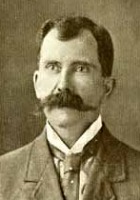John Philip Bourke
John Philip Bourke Poems
With head erect I fought the fight
Or mingled with the dance,
And now I merge into the night
With utter nonchalance.
...
With head erect I fought the fight
Or mingled with the dance,
And now I merge into the night
With utter nonchalance.
...
When I am dead
Bring me no roses white.
Nor lilies spotless
And immaculate,
...
Oh, he led his love through the church's aisle,
And be cried 'You bet!' with an eight horse smile.
When, the parson asked would he love and care
For the dainty thing with the forehead fair,
...
A little ray from a shaded light
A colour splash on a field of white
Too short a day and a damn long night
...
Wages ! No, not us old party,
While a rattle's in the shaker
Patched and grimy, strong and hearty,
Best of cobbers with the baker.
...
There is no need to say good-bye,
And weep;
There is no call on us for tear or sigh.
...
They coiled the drams and filled the bags.
And whistled loud and gaily,
For now the rush was on at last
They'd been expecting daily ;
...
Many a wind is blowing, .
Our from the weary West,
Many a wave is chasing
Opaline crest on crest ;
...
John Philip Bourke Biography
John Philip Bourke was an Australian poet. Bourke was born in Nundle, New South Wales, on the Peel River diggings, New South Wales, the son of William David Bourke, butcher, and his wife Jane, née Shepherd. After a primary education, he became a prospector with his father. At 17 years of age, he sold a claim for £600. He then became a school teacher in September 1882 and occasionally contributed verse to The Bulletin. He retired from the education department in 1887 after being found drunk by a school inspector. In 1894 he went to the recently discovered goldfields in Western Australia, prospected in various parts of the west, and at variously made and lost a considerable sums of money. About the turn of the 20th century Bourke took up journalism and was a regular contributor to the Kalgoorlie Sun. He was a writer of vigorous prose and verse which gave him a local reputation, but he was comparatively little known away from the gold-mining towns. He visited the eastern states of Australia for medical advice and to seek a publisher for his books in 1913. Bourke died at Boulder, Western Australia, on 13 January 1914. A selection from his verse, Off the Bluebush, edited by A. G. Stephens, was published in Sydney in 1915. 'Bluebush' Bourke was a popular poet, one of the leading poets of the goldfields along with E. B. Murphy. In his own phrase they were "singers standing on the outer rim, who touch the fringe of poetry at times". Murphy wrote more and had the larger audience, but Bourke was the more musical and more often did succeed in touching the fringe of poetry. Bourke's own estimation of his talent was modest: We singers standing on the outer rim Who touched the fringe of poesy at times With half-formed thoughts, rough-set in halting rhymes, Through which no airy flights of fancy skim — We write "just so", an hour to while away, And turn the well-thumbed stock still o'er and o'er … The verse and prose of 'Bluebush' is a barometer of changing feelings and attitudes on the Western Australian goldfields. His poems depict local 'characters', scenes of poverty and hardship and the consolation of 'booze'. But a sense of humour is evident and a strong commitment, as part of a radical movement, to mateship and social justice. Many of the poems are addressed specifically to the wide audience of miners and prospectors who read his verse.)
The Best Poem Of John Philip Bourke
John Philip Bourke
With head erect I fought the fight
Or mingled with the dance,
And now I merge into the night
With utter nonchalance.
We singers standing on the outer rim,
Who touch the fringe of poesy at times
With half-formed thoughts, rough-set in halting rhymes,
Through which no airy flights of fancy skim
We write 'just so,' an hour to while away,
And turn the well-thumbed stock still o'er and o'er,
As men have done a thousand times before,
And will again, just as we do to-day . . .
If I could take that rosebud from its stem,
And weare its petals in a simple rhyme,
So you could hear the bells of springtime chime
And you could see the flower soul in them
Or else, we'll say, a magpie on the limb,
Greeting the sunrise with its matin song
To catch the music as it floats along,
And link its spirit to a bush-child's hymn.
Or, if but then the limitations rise,
Like barriers across the mental plain,
And mists and things obscure the rhymer's brain,
And dull his ears, and cloud his blinking eyes.
And so we write as Nature sets her gauge
No worse than most, and better, p'raps, than some;
But should a man remain for ever dumb
When only rhyming fills his aimless page?
